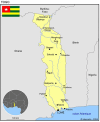Gynecological health care services utilization and violence among female sex workers in Togo in 2021
- PMID: 39533277
- PMCID: PMC11556016
- DOI: 10.1186/s12978-024-01887-x
Gynecological health care services utilization and violence among female sex workers in Togo in 2021
Abstract
Background: Female Sex Workers (FSW) in Sub Saharan Africa face multiple challenges increasing their vulnerability to poor health, particularly poor sexual and reproductive (SRH) health outcomes and violence. The aim of this study was to assess the use of gynecology health care services and factors associated with its use as well as experiences of violence among FSW in Togo.
Method: A cross-sectional study was carried out in 2021 among FSW in two cities of Togo. A snowball sampling method was used and initial seeds were identified in each site in collaboration with FSW non-governmental organizations. A logistic regression was performed to identify factors associated with the use of a SRH service and violence.
Results: A total of 447 FSW with a median age of 30 [IQR: (24-38)] participated in this study and 43.4% of them had reached at least secondary school. Among them, 29.1% reported having been to a gynecological consultation over the previous year. Factors associated with a gynecological consultation included: living in the Lomé capital city (aOR = 0.35, 95%CI 0.22-0.54), and an experience of condom breakage or slippage (aOR = 2.00; 95%CI 1.19-2.64). The majority reported at least one lifetime pregnancy (87.9%), 39.8% reported ever having an unintended pregnancy and 67.6% of them ever had an abortion. Finally, 61.1% indicated being victims of physical, sexual, or emotional violence in the previous six months. Sex workers living in Lomé (aOR = 1.78; 95%CI 1.16-2.73); a history of abortion (aOR = 1.53; 95%CI 1.03-2.31) and having more than 15 clients per week (aOR = 4.87; 95% CI 1.99-11.94), were more likely to experience violence.
Conclusion: There is an under-utilization of health care services among FSW in Togo in addition to overall poor sexual and reproductive health outcomes with a high prevalence of gender-based violence. Those results highlight the importance of continued advocacy for the integration of SRH care with HIV prevention services geared toward FSW as well as a holistic approach to SRH care with innovative ways to prevent violence.
Keywords: Female sex workers; Health care services; Key populations; Sexual and reproductive health; Violence.
Plain language summary
Female Sex Workers (FSW) in sub-Saharan Africa face multiple challenges including challenges linked to access to health care services, particularly sexual and reproductive health services and issues related to violence. However, few studies in Togo have explored sexual and reproductive health and violence among FSW. We used a cross-sectional study design to describe the use of sexual and reproductive health services by FSW in Togo and to document their experience of violence. A total of 130 FSW reported a gynecological consultation in the previous year, 42.7% had STI symptoms and 60.7% of them consulted a health care professional for those symptoms. We also found that 179 FSW ever had an unintended pregnancy and among them 67% ever had an abortion. Almost all FSW reported the use of condoms as their main contraception method, however 87.7% of FSW used condoms consistently with their clients. The majority of FSW reported ever being victim of physical, sexual or emotional violence. FSW with a history of abortion, with a high number of clients per week (> 15), and living in the capital city were more likely to have experience of violence. Those results would be helpful as a basis to advocate for a greater access of FSW to SRH services as part of their package of HIV prevention, care and treatment.
© 2024. The Author(s).
Conflict of interest statement
Figures
Similar articles
-
High burden of self-reported sexually transmitted infections among female sex workers in Togo in 2021.Front Public Health. 2022 Aug 3;10:915029. doi: 10.3389/fpubh.2022.915029. eCollection 2022. Front Public Health. 2022. PMID: 35991055 Free PMC article.
-
Sexual violence against female sex workers in The Gambia: a cross-sectional examination of the associations between victimization and reproductive, sexual and mental health.BMC Public Health. 2015 Mar 19;15:270. doi: 10.1186/s12889-015-1583-y. BMC Public Health. 2015. PMID: 25886187 Free PMC article.
-
The prevalence and correlates of unintended pregnancy among female sex workers in South China: a cross-sectional study.Reprod Health. 2024 Jul 24;21(1):110. doi: 10.1186/s12978-024-01853-7. Reprod Health. 2024. PMID: 39049096 Free PMC article.
-
Stigmatizing and inaccessible: The perspectives of female sex workers on barriers to reproductive healthcare utilization - A scoping review.J Adv Nurs. 2024 Jun;80(6):2273-2289. doi: 10.1111/jan.16010. Epub 2023 Dec 8. J Adv Nurs. 2024. PMID: 38069507
-
Sexual and reproductive health services during outbreaks, epidemics, and pandemics in sub-Saharan Africa: a literature scoping review.Syst Rev. 2022 Aug 9;11(1):161. doi: 10.1186/s13643-022-02035-x. Syst Rev. 2022. PMID: 35945580 Free PMC article.
References
-
- United Nations Population Fund. Sexual & reproductive health. https://www.unfpa.org/sexual-reproductive-health. Accessed 10 Dec 2017
-
- World Health Organization. Defining sexual health https://www.who.int/teams/sexual-and-reproductive-health-and-research/ke.... Accessed 4 Aug 2022
-
- World Health Organization. Sexual and Reproductive health fact sheet: WHO African region https://www.afro.who.int/publications/sexual-and-reproductive-health-fac.... Accessed 14 Mar 2022
-
- Joint United Nations Program on HIV and AIDS. UNAIDS Fact Sheet 2022. https://www.unaids.org/en/resources/documents/2022/UNAIDS_FactSheet. Accessed 14 Mar 2022
MeSH terms
LinkOut - more resources
Full Text Sources


